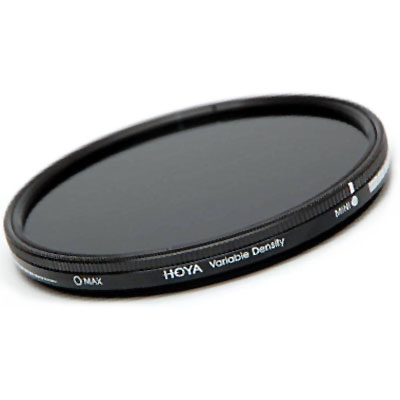
£271.99 +
£1.00 Delivery from Camera King
Limited Time Offer ( Valid until:
Monday 5 May
)
For Longer Exposures Without changing the aperture, the Variable NDX filter allows the freedom to change the shutter speed according to the effect desired. For example, without adjusting the aperture, the same 1/60 scene can be taken using the Variable NDX filter with shutter speeds from 1/20 to 6 seconds, with just a turn of the outer filter ring. The problem of diffraction is eliminated by being able to work with a slow shutter speed. For Wider Apertures With the Variable NDX filter, the shutter speed remains constant for a wide aperture easily creating a blurred background effect. Prevents Overexposure / Highlight Clipping Even with a shutter speed of 1/8000 seconds, a large aperture of F1.4 or F1.2 can cause overexposure / highlight clipping. With the Variable NDX filter, this overexposure is eliminated. For HDSLR MOVIES For HD video-enabled cameras, use the Variable NDX filter to easily adjust light control and shutter speed. The Variable NDX filter makes it simple to produce blurred background effects, simulate a night scene or create manual fade in / fade out effects. It is also perfect for use in bright locations such as beach or snow scenes and city scapes. Easy to Operate / Easy Framing / Easy Focus With a tripod mounted camera, use the brightest setting for framing and focus and then increase the density to your desired level by simply turning the outer filter ring. 1. Framing and Focus 2. Turn the outer Ring 3. Adjust the Aperture and Shutter Speed 4. Shoot Avoid Vignetting The singular versatility of the Variable NDX filter not only replaces a whole set of stacking neutral density filters it also removes vignetting which may be caused by using multiple filters. For Longer Exposures Without changing the aperture, the Variable NDX filter allows the freedom to change the shutter speed according to the effect desired. For example, without adjusting the aperture, the same 1/60 scene can be taken using the Variable NDX filter with shutter speeds from 1/20 to 6 seconds, with just a turn of the outer filter ring. The problem of diffraction is eliminated by being able to work with a slow shutter speed. Prevents Overexposure/Highlight Clipping Even with a shutter speed of 1/8000 seconds, a large aperture of F1.4 or F1.2 can cause overexposure/highlight clipping. With the Variable NDX filter, this overexposure is eliminated. For HDSLR Movies For HD video-enabled cameras, use the Variable NDX filter to easily adjust light control and shutter speed. The Variable NDX filter makes it simple to produce blurred background effects, simulate a night scene or create manual fade in/fade out effects. It is also perfect for use in bright locations such as beach or snow scenes and cityscapes. Newly Developed Unique Design Kenko's uniquely designed variable neutral density filter provides the equivalent brightness range of ND 2.5 to ND 1,000 (practical use being up to ND450). Polarizing Effect Cancellation The Variable NDX filter changes the brightness of light using a polarized filter. This new filter uses a "polarizing effect cancellation" where a polarized filter is used, but purely for controlling the amount of light with no effect on color balance, glare or reflections. DMC - Digital Multi-Coated Digital multi-coated filters greatly reduce the appearance of lens flare and ghosting caused by reflections. The Benefits of Having a Depolarization Plate Variable NDX filter using a depolarizing plate Random polarization is eliminated when natural light passes through the depolarization plate, minimizing any change in color by using 2 layers of polarizing film. Exposure Values Chart The Variable NDX filter changes exposure values by rotating the front element of the filter. In order to evaluate the correct exposure to use, please refer to your camera's built in meter. (Please note: The scale position on the side of the filter is not proportional to the ND values). For Wider Apertures With the Variable NDX filter, the shutter speed remains constant for a wide aperture easily creating a blurred background effect. Safety Precautions Human injury or material damage may occur if filter is used mistakenly because instructions are not observed. Do not drop or impact filters. If glass breaks, do not touch it with bare hands, as doing so may cause injury. Moreover, filter frame may become misshapen, and unattachable to lens. Do not leave filter in direct sunlight or hot & humid locations, as doing so may discolor filter, which will prevent desired effect. Be sure to properly attach filter to lens. Failure to do so may mean that the filter will detach and fall from the lens, which will damage the filter thread. There are some specialist wide-angle lenses that have extremely protruding front eye centers. Attaching a filter to such a lens may cause contact between filter and lens, possibly scratching the lens, so be sure to carefully check the gap between the filter and lens while attaching the filter. Be sure to become fully acquainted with filter effects prior to taking photographs. Structural Weakness - Color Shift When using a neutral density higher than 450, cross-like color variations may occur. Structurally this problem cannot be eliminated due to the 2 layers of polarizing film. Upkeep To clean off dirt from glass, add a small amount of lens cleaner to a lens cloth or lens paper, and wipe the lens as if drawing a circle. When glass is clean, wipe it dry with lens cloth, making sure that no lens cleaner remains on the glass. When filter is not in use, place it in supplied case, and store away from direct sunlight, and very hot and humid locations. Filter Size(mm): 77-82 DMC - Digital Multi-Coated For Longer Exposures For Wider Apertures Prevents Overexposure / Highlight Clipping For HDSLR MOVIES... More







